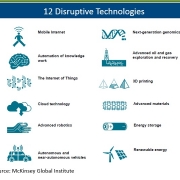Democracy of the people, by the people, for the people seems to be failing us. Politicians elected to make decisions on our behalf seem to listen more to their political supporters than the experts.
Climate change is a perfect example of the failure of the current democratic systems to deliver up good governance.
Around the world, there is a growing consensus that we need to take action on climate change. Some 97 pr cent of climate scientists agree on the science, and what the future holds if we do nothing – rising sea levels, wilder weather, displaced populations and changing ecosystems to begin with.
Even some past detractors are changing their minds. In Australia, AGL, one of nation’s largest coal-fired electricity generators, recently announced it would be phasing out its plants by 2050, and expanding its efforts in alternative energy.
But the climate deniers still fight on, hoping to persuade us that the scientific community is committing a massive fraud on the citizens of the world.. In April the Australian Federal Government announced it would be “investing” $4 million to help Bjorn Lomborg who contends that climate change is “overstated” and “not a priority”, to set up a new “consensus center” at the University of Western Australia. Lomborg is from Denmark, that is now the world leader in wind-power generation. Denmark currently generates 39 per cent of its electricity needs from wind, and plans to achieve 50 per cent by 2050. Even in nearby England, where the conservatives have been in government for the past four years, 25% of homes are powered by wind.
This is the same government that slashed investment in R&D for co-operative research centers and cut the funding of Australia’s premier research institution, the Commonwealth Scientific and Industrial Research Organization. It also abolished the Climate Commission, which comprised Australia’s best climate scientists, economists and energy experts on the basis that the $1.5 million annual operating costs was too expensive.
So what’s going on?
Its all about pandering to the base, the reliable rusted-on voters who deliver political support, and the vested interests that deliver financial support.
A few years ago, the current Australian Prime Minister Tony Abbott, defeated the then leader of the opposition, Malcolm Turnbull, in a vote to be the leader of the parliamentary Liberal Party.
Turnbull, an advocate of carbon pricing, was preparing to do the unthinkable; support the Labor Party government of the time on legislation to implement an emissions trading scheme. This plan so upset his rather right-wing backbench and some of their mining industry supporters, many of them climate change deniers, they booted Turnbull from the leadership, by a slim majority, 42-41.
Abbott survives as Prime Minister by a knife-edge majority of parliamentary support, even though his performance in the job has been abysmal. His public approval rating hit a recent low of just 29 per cent.
The breakdown of Australian bi-partisanship on climate change over the past decade mirrors what is happening in the USA. Despite overwhelming evidence from highly respected scientists at NASA and NOAA, the Republican and Democratic parties, at least at the Federal Level, are on a collision course over tougher rules for coal-fired power plant emissions.
Meanwhile, the majority of Americans (63%), like the majority of Australians (75%), believe that climate change is real and a major threat. Yet a small minority in both countries have managed to shift the political game to serve their interests at the expense of everyone else.
If the purpose of democracy is to best serve the needs/interests of the people in both the long term and the short term, then the system of Parliamentary democracy, is longer working as well as it should.
Francis Fukuyama, an influential member of the Reagan administration and author of The End of History, argues that a both-and solution is necessary: liberal democracy in partnership with an “autonomous administrative bureaucracy” composed of people whose job it is to bring the best knowledge and data to bear on any and every issue.
This was once the case in Australia, where the role of the public servant was to give fearless advice to the political leadership, no matter who was in power. Not any more. Australian political leaders now routinely get rid of department heads that offer contrary advice in favor of those who are more compliant or ideologically aligned, rather like the American model. According to Fukuyama, this leads to corruption of the system.
But even when you have a powerful bureaucracy to balance an equally powerful political class, there is no guarantee it will be any better. Consider the current European Union “administrative think” that supports austerity as a way to increase economic output.
In System Thinking terms. a lens through which it is useful to analyse any issue, corruption occurs when the goals of the system are perverted to meet the narrow needs of a few, rather than the broader interests of the many. It comes in many forms, from the extreme case of taking bribes (either administrative or political) to give a party an unfair advantage over another, siphoning off funds to pet projects of either the politicians or administrators, or by simply ensuring that an industry gets preferred treatment, and is allowed to main, harm, despoil or generally have a negative impact of citizens despite the evidence to the contrary, as occurs when there is a free flow of talent back and forth between industry and the bureaucracy.
Workshop
So here is a workshop about political governance.
1. What, in your opinion, should be the goals of the political system? Whose interests should it serve, and how should the system serve those interests?
2. What impact does accelerating change, rapidly expanding complexity and divergence and deepening of disciplines have on the ability of citizens and political class to be informed about the latest knowledge and data on complex and conflicting issues? Give examples of conflicts that are crying out for better analysis.
3. In most current systems of parliamentary democracy, citizens vote for a person to represent their interests in decision making, rule or law making forums. Is the role of representative still relevant? What might an alternative role for the political class be? Where should we strike a balance between representation and leadership?
4. What feedback loops, checks and balances might we build into any new system of democracy to ensure the system can adapt rapidly to new data, new and more robust knowledge and paradigm shifts?
5. Thinking about the way democracy works in your community, state or country what’s working well you would want to KEEP, what’s not working at all that you would want to ABANDON, what could be improved you might want to RE-INVENT, and what is so totally in the past, that you might want to TRANSFORM it into something new, that is a better fit with the emerging paradigm?
6. If you were given the task of designing a democratic system that made it possible for all people to be better and more fully informed about the best and most up-to-date data, the most reliable (or superb theories), unfettered by dogma/ideology, and with biases identified and made clear, what kind of system would you design? What features would it have compared to the existing system. Respond like this: Instead of (current state) we might have (new state).








Leave a Reply
Want to join the discussion?Feel free to contribute!